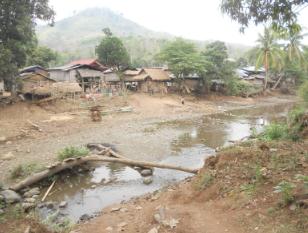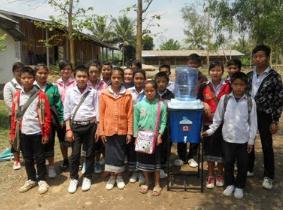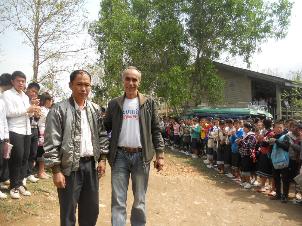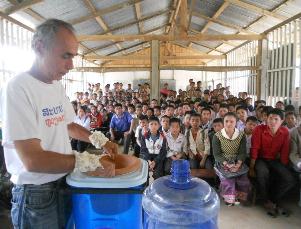
Laos is a former French colony that got caught up in the Vietnam war. Credit: Courtesy of Steve Rutledge

Villages in Laos benefit from Rutledge's water filtration systems. Credit: Courtesy of Steve Rutledge

"When you see the euphoria and respect on the faces of those villagers, you know you've given them hope," Rutledge says. Credit: Courtesy of Steve Rutledge
Take a moment, if you will, to consider your morning rituals and ablutions. How do you start the day? A splash of cool, reviving water on the face? Or maybe a lovely hot shower to get your blood pumping. Perhaps you’re like me and enjoy an icy glass of H20 to wash away the cobwebs after a night’s slumber. Yes, whenever the whim takes us, we have ready access to something we often take very much for granted. Just turn on the tap, and there it is: clear, sparkling water.
Half a world away it’s quite a different story. Sure there’s lots of rain falling in Southeast Asia, but there are many countries that don’t have the funds or facilities to make sure the water is adequately cleaned and not host to a veritable treasure trove of germs and parasites. Take the tiny country of Laos in Southeast Asia, for example.
“You can only imagine the lack of hygiene in Laos,” says Steve Rutledge, retired businessman and founder of a charitable organization called Adopt a Village in Laos. “Imagine a plastic pail, with four inches of water in the bottom, and washing your hands in that water with the 40 other people who will be eating with you. And remember that in Laos, you eat with your hands. So if one person has diarrhea, then everyone gets it. It becomes an ever-present fact of life.”
Rutledge’s charity has become a personal crusade over the last two years, providing hundreds of water filtration devices to hard-to-reach Laotian villages nestled deep in the country’s jungles. Of course, large urban centres like Luang Prabang and the capital city, Vientiane, have an organized infrastructure for water supply and treatment, but the lack of railways and roads into the heavily treed regions makes it difficult to provide and encourage adequate sanitation.
So, why is Laos still struggling to educate its citizens – most of whom live in rural areas – about the importance of safe drinking water? Even Southeast Asian neighbours like East Timor and Cambodia (both considered to be developing countries) have a generally accepted standard of basic water hygiene and various ways of supplying it to their people.
The answer is complicated, involving factors both within and outside of the small country. A former French colony, Laos gained independence in 1953, only to become almost instantly embroiled in a brutal civil war. Then the North Vietnamese barged in to take over areas for supply routes in their war with South Vietnam, the Americans joined in, and all hell broke loose. This is often referred to as “America’s secret war,” when the US essentially bombed the crap out of Laos in the hopes of taking out North Vietnam’s supply routes, while the real battle raged on next door.
Laos holds the dubious distinction of being the most bombed country, per capita, in the world, with more than 250 million US bombs unceremoniously dropped on the heads of its citizens during the war in Vietnam. Still riddled with unexploded shells (some estimates say up to 80 million), it’s been prohibitively difficult for the little country to rebuild its infrastructure. After all, it’s hard to motivate a construction crew whose every step could mean instant death.
“One plane load of bombs was dropped every eight minutes, 24 hours a day, for nine years,” Rutledge points out. “They’re also completely landlocked and still to this day have thousands of people getting maimed every year by unexploded shells. No wonder they’re still living in poverty.”
Like many of us, Rutledge was happily oblivious to the plight of Laotians until an unexpected detour occurred during a vacation in Costa Rica. His partner Mike’s identification was stolen, forcing him to return to his home country of Singapore for replacements. Once there, the two decided to explore other areas of Southeast Asia while waiting for things to be sorted out. That first trip to Laos was a life changer for Rutledge.
“They’re just barely surviving,” he says. “We saw a lot of villages that didn’t even have water or toilets or schools. I figured, I’m retired, so why not help out?”
For Rutledge, helping out didn’t just mean putting in a week of touring and commiserating, followed by some leisurely cheque-writing. He’s travelled to Laos several times in the last two years, spending months at a time helping to build schools, supply water filtration systems and teach villagers how to use them. There’s no easy way to get to his various destinations, meaning the journey requires as much exertion as the work itself.
“There was one village called Pha Yong,” Rutledge remembers. “To get there from Luang Prabang is a three-hour mini-van ride to Nong Khiaw, where they have a little port on the river Ou. From there it’s a 45-minute ride by longboat up the river, then another hour-and-a-half trek on foot to the village through the muck. There’s lots of leeches.”
Despite the gruelling expedition – or perhaps, in part, because of it – the reception that Rutledge receives more than makes up for the effort.
“There was one particular village where I had delivered water filters a couple of days earlier,” he says. “It was so difficult getting these to the families, and we were a day late. We finally got there, and they all met us down at the river . . . the entire village of 84 families. The tears just started coming.”
In between his visits to Laos, Rutledge continues his efforts on its people’s behalf. He lobbies both friends and strangers to sponsor villages by donating the cost of a water filter or money to help build schools. Given that it’s still a developing country with few building regulations and cheap materials, donors get quite the bang for their buck.
“It’s $65 for a 35-litre filtration unit, which is good for a family of eight,” Rutledge says. “Our donors not only get a tax receipt, they also get an emailed picture of the receiving family with the water filter system. We had over 100 requests last year donated as Christmas gifts, as well as donations in memoriam.”
They also began to receive offers of physical help from people touched by Rutledge’s mission. Roland Drake had no idea the turn his life would take when he stopped by Woody’s one night for a beer back in July 2010 in Toronto.
“I started chatting with Steve’s partner, Mike, and he talked about this place in Southeast Asia that I’d never even heard about,” Drake says. “It really got under my skin in a good way, and I became totally enthralled with it.”
Drake joined Rutledge’s lobbying and awareness efforts, designing a brochure for the charity and finally visiting Laos in 2011. Needless to say, it was not a typical vacation.
“It’s a brutally long flight,” he says. “Twenty-two hours, not including the waiting time in airports. But once you get there you realize it’s a very different place, with a totally different vibe than we’re used to.”
Rutledge still chuckles when recalling the tale of one visitor who felt as though he’d arrived at the Church and Wellesley of Southeast Asia. “I heard about this one guy who came as a journalist from Europe,” Rutledge says. “He was so pleased that there were so many gay men, until his friend told him, ‘They’re not gay, they’re just nice.”
As winter approaches, Rutledge is already planning his next trip to Laos – a return to the place and a people that never stray far from his thoughts. Again, it will be no restful sojourn.
“It’s not easy,” he admits. “In fact, it can be absolute hell. But when you see the euphoria and respect on the faces of those villagers, you know you’ve given them hope. Hope for a healthier life and a chance to live better. It’s an amazing feeling that I can barely describe.”

 Why you can trust Xtra
Why you can trust Xtra


